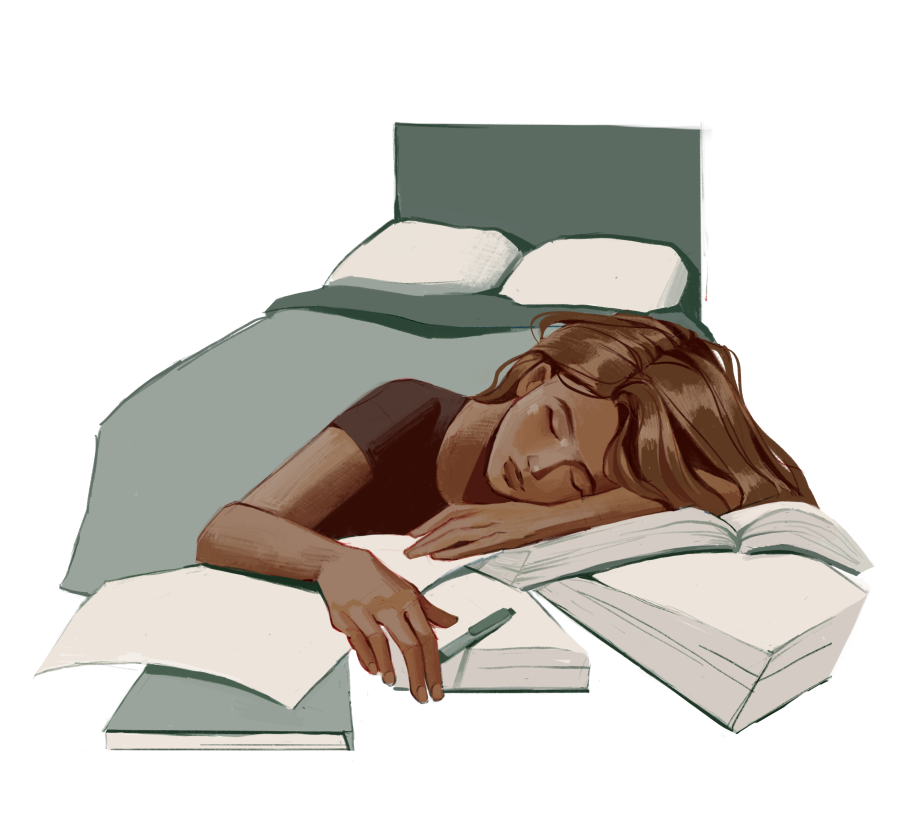It’s 1 a.m.. I’m at my dinner table, slumping over the expanse of school work spread out before me. I urgently flip through my physics notes, looking for an explanation that is probably not there. After two minutes, I give up and crack open my computer.
Among the 15 tabs open, a Google slideshow glares out at me. Thirty-six circular icons pop into the top right hand corner of my screen. I guess I’m not the only one working this late, alone and struggling to stay awake.
As an honors student surrounded by competitive overachievers, I know how hard it is to cram homework, extracurriculars and a social life into one 24-hour day. However, prioritizing sleep is more beneficial to your body and mind than staying up past midnight to finish school work.
According to an American Academy of Pediatrics study, 75 percent of 12th graders received less than the recommended eight hours of sleep compared to only 16 percent of sixth graders. As students get older and their schedules become busier, their sleep durations decline.
There are numerous factors that lead to insufficient sleep among teenagers, and I’m sure everyone has heard them before. Old schoolers blame the disruptive electronic devices that alter our circadian rhythms, inhibiting our ability to fall asleep at a reasonable time. Parents fault schools’ early start times. Some students blame their poor sleep habits on their caffeine addiction.
Regardless, insufficient sleep can lead to multiple consequences, both short and long term. According to the National Library of Medicine, sleep deprivation leads to reduced attention span, lack of energy and worsened memory. A continuous lack of sleep can lead to sleep debt, a cumulative effect of lack of sleep, which is often associated with anxiety, depressive symptoms and even suicide.
Let me reiterate this. Staying up late to finish memorizing your history vocabulary will not only be challenging because of your reduced attention span due to lack of sleep, but you might not be able to remember those vocab terms the next morning because of your worsened memory.
Showing up late to first period in sweatpants, holding a half-empty Peet’s coffee cup and parading a backpack stuffed to the brim with notebooks and crumpled paper is common enough at Paly that no one seems to notice how tired you are. As soon as you find your seat, the first conversation of the day starts off with how much sleep you got the night before.
The fact that one student got the least amount of sleep compared to their fellow classmates is awarded as a tribute to being an ambitious, hardworking student who has achieved that hustle lifestyle. This lack-of-sleep culture is toxic, though, and results in an unrelenting sleep deprivation loop.
Society praises those who push through their exhaustion and work themselves to the bone. In Palo Alto, the most dedicated students are seen as the ones who work late into the night because they have to attend their extracurricular activities and maintain their social life.
However, these societal pressures only enforce that a students’ self-worth is tied to what they accomplish in a given day, which causes students to stay up later to study.
While most students are aware of the detrimental effects of sleep deprivation, they make no effort to change their sleep schedule or combat these cultural customs.
To those students who brag about getting less sleep than their friend or drink five cups of coffee before 9 a.m., stop promoting this sleep culture. The hustle lifestyle is imaginary, and pressures students to compare themselves to other students. It is a culture that not only ruins people’s mental health, but physically damages their body as well.
Instead, the hustle lifestyle should encourage genuine, healthy productivity rather than the counterproductive sleep deprivation it glorifies.
When your peers brag about sleep deprivation, don’t give in to the temptation and participate in what shouldn’t be a competition. Acknowledge that your sleep schedule is something that needs to be improved, and then fix it.





Sam • Jan 29, 2025 at 6:07 am
I swear I didn’t do my homework because so I could sleep. I’m a 7th grader and yesterday got real bad sleep and it sucked. Not sacrificing sleep for some piece of homework. you can give me zeros, I rather sleep. I got a real busy schedule since I’m an athlete (not for my school, combat sports).
Faraz • Mar 2, 2023 at 10:10 am
I completely agree with this statement. Sleep is also essential for our mental health and wellbeing, so it should always be prioritized. Not only does it help us feel more alert and productive, but it can also reduce our stress levels and help us regulate our moods.